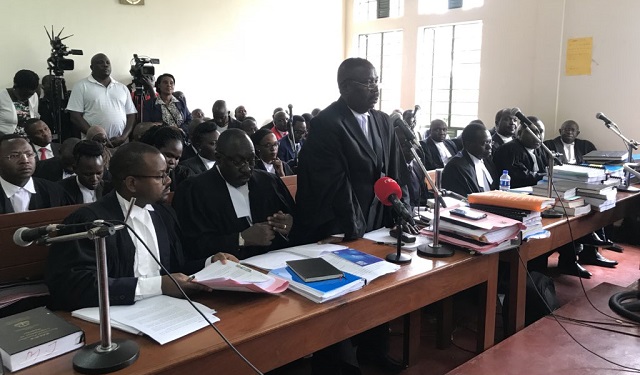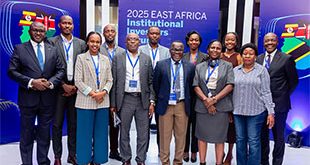
Kampala, Uganda | THE INDEPENDENT | The Attorney General’s legal team has begun submissions into the Constitutional Court petition seeking the annulment of the Constitutional Amendment Act 2017.
The team led by Deputy Attorney General Mwesigwa Rukutana has defended Parliament’s decision to lift the Presidential age limits and extending of the term of the current Parliament from five to seven years.
Rukutana assisted by the Solicitor General, Francis Atoke, has also defended the 13 billion shillings that government drew from the Consolidated Fund to facilitate legislators to consult in their respective constituencies on the Private Member’s Bill initially tabled by Igara West MP Raphael Magyezi.
Rukutana in his submission before the court sitting in Mbale admits that each of the MPs was given 29 million shillings to consult on the Bill.
He however denies that the expenditure of the said money was contrary to Article 93 of the Constitution which bars government from drawing money from the consolidated fund to finance a private Member’s Bill.
Rukutana claimed that the 13 billion shillings did not have a charge on the consolidated fund. He said the money was drawn from the Parliamentary Commission’s budget.
Solicitor General Francis Atoke told court that they plan to use the 29 million shillings facilitation to MPs to argue that there was consultations. His assertion attracted questions from judges.
The Attorney General’s team however had a tough time to convince the judges on the fact that government money was spent to fund a private Member’s Bill.
The Bill was tabled before Parliament in September 2017 MP Raphael Magyezi and later facilitated with government money.
The petitioners have in the past argued that Parliament and government breached Article 93 of the constitution. They have used that argument as one of the reasons why the courts should annul the Constitution Amendment Act 2017.
Deputy Chief Justice Alfonse Owiny-Dollo and later Justice Kenneth Kakuru wondered why the government did not taken over the Raphael Magyezi Bill.
Rukutana insisted that Cabinet did not see anything wrong with the Private Member’s Bill and that the government was not hiding behind Magyezi.
Another issue of contention has been on the extension of the term of office for the President and the current Parliament from five to seven years.
The petitioners have argued that Parliament breached the constitution and its own rules by failure to consult the people on the amendment extending their term in office for more two years.
Parliament, while considering the Bill in December last year, also suspended rules regarding the 14-day sitting rule between the first and second readings of the Bill.
While Rukutana argued that the 14-day rule is not a requirement for amending articles of the constitution that are not entrenched, the petitioners insist that Parliament violated the constitution.
Justice Kakuru said Parliament seemed to have been given the leeway to determine and extend their term in office without consulting the people or their voters.
Justice Owiny-Dollo said the the legal arguments aside, parliament may have breached the principal of good sense by avoiding to consult the people.
Where it all began
On December 20, 2017, Parliament passed into law the Constitution Amendment (No.2) Bill 2017 with 317 MPs voting for while 62 voted against the controversial legislation. Seven days later, President Museveni assented to the bill.
The act amended Article 102(b) of the constitution which barred people above 75 years and those below 75 years from standing for the office of president of Uganda. In the changes, both these caps were removed for presidential candidates as well as those standing for local council offices.
The Act also extended the term of office for president and parliament from five to seven years. It also restored two-term presidential clause which had been removed in an earlier amendment in 2005.
The passing of the age limit act, however, was a climax of an acrimonious process which started in late September. This included suspension of at least 24 MPs, raid of parliament chambers by security forces and deployment of security personnel inside the Catholic and Anglican chapels within the Parliament Building as the House debated the bill.
It was on this basis that seven different interested parties petitioned the Constitutional Court challenging the legality of the constitutional amendments passed by parliament on December 20.
The petitioners include Uganda Law Society who are represented by Professor Fredrick Ssempebwa. The second party is that led by the Leader of the Opposition in Parliament Winfred Kiiza and opposition chief whip Ssemujju Ibrahim Nganda. This party also has MPs Gerald Karuhanga, Jonathan Odur, Mubarak Munyagwa and Allan Ssewanyana and they are represented by Lord Mayor Erias Lukwago and human rights lawyer Ladislaus Rwakafuuzi.
The other petitioners include lawyer Male Mabirizi, former presidential candidate Abed Bwanika, and Prosper Businge who calls himself a concerned citizen.
A panel of five judges led by deputy chief justice Alfonse Owiny-Dollo, Remmy Kasule, Elizabeth Musoke, Cheborion Barishaki and Kenneth Kakuru are hearing the petition.
 The Independent Uganda: You get the Truth we Pay the Price
The Independent Uganda: You get the Truth we Pay the Price



